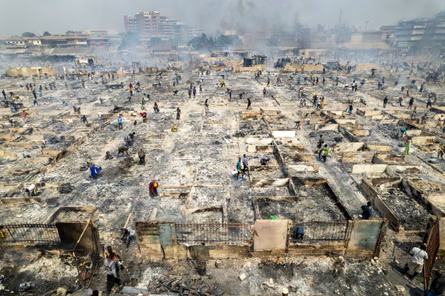
Ghana’s firefighting capacity is under intense pressure following the fourth market fire in just seven days, highlighting persistent infrastructure and accessibility challenges across the capital’s trading hubs.
The latest blaze struck Madina Market in the early hours of Friday, September 19, 2025, around 1:00 a.m., engulfing a one-storey warehouse and threatening surrounding stalls.
Eyewitnesses reported thick smoke filling the night sky as firefighters struggled to reach the site due to narrow pathways and congested market layouts.
Four fire tenders were deployed to contain the fire.
Assistant Chief Fire Officer I Rashid Nisawu, Greater Accra Regional Fire Commander, described the recurring accessibility issues as a “grave concern,” warning that inadequate maneuvering space for fire tenders exacerbates destruction during emergencies. “Unless market spaces are redesigned to allow proper access, these disasters will continue to escalate,” he said.
The Madina fire follows a string of incidents beginning September 13, including a blaze at Accra Timber Market attributed to unattended burning of rubbish. Despite reconstruction efforts, markets remain vulnerable due to wooden structures and maze-like layouts that trap emergency vehicles during critical response times.
Traders at Madina expressed frustration over the repeated incidents, which not only destroy property but undermine business confidence. Many blamed limited emergency access for worsening damage and delaying containment.
GNFS has called on municipal authorities to re-engineer market layouts, improve pathways, and introduce fire-resistant construction materials. Recommendations include borehole installations, demarcated access routes, and fire hydrant systems to enable faster response times.
The crisis extends beyond Accra, affecting thousands of traders and disrupting supply chains nationwide. GNFS data indicates most market fires are preventable, often caused by electrical faults, unattended cooking, or poor waste management. However, structural design flaws amplify the scale of destruction.
Friday’s incident underscores the urgent need for comprehensive urban planning reforms and coordinated emergency preparedness. Without systematic changes addressing both market design and access requirements, Accra’s markets will remain at high risk, threatening both lives and livelihoods.



